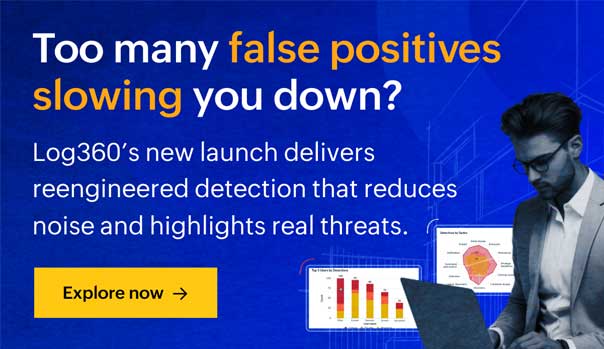What is log analysis?
In this page
- Why is log analysis essential?
- Let's take a look at how log analysis is carried out:
Log analysis is the process of investigating the collected logs to identify patterns and abnormal behaviors, establish relationships between the logs collected from various sources, and generate alerts if a threat is detected. Log analysis can be performed using different techniques including log correlation, forensic analysis, and threat intelligence to identify malicious activities. It also plays a major role in gaining insight into the network activities.
Why is log analysis essential?
It might be difficult to identify malicious activities in a network without having proper analysis techniques in place. Since logs contain information on every activity happening in the network, it is essential to analyze these logs to:
- Prevent data breaches.
- Monitor user activities and detect abnormal user behaviors.
- Protect sensitive data from attacks.
- Detect cyberattacks at the earliest stage possible and mitigate them.
- Prevent data loss due to exfiltration.
- Comply with IT regulations.
About this explainer: Explore our in-depth series on What is Log management and Log analysis and uncover expert tips along the way.
Let's take a look at how log analysis is carried out:
- The collected logs are aggregated. Aggregation is a process by which all the different logs are collected from different systems, and files are gathered and stored in a central location.
- The logs are then normalized and converted into a readable and structured format.
- The normalized log data is then analyzed and correlated using predefined rules in order to identify the relationship between the logs collected from disparate sources. Reports and interactive dashboards are generated corresponding to the analysis of the collected logs. Correlation can indicate if the log data from different sources correspond to one event. If the event threatens the safety of the network, an alert will be raised. The criteria for raising alerts are predefined or can be customized based on the organization's needs.
- The analysis can also be strengthened by applying forensic analysis and threat intelligence. Performing forensic analysis on log data can help identify the point of attack in a network. It can specify how an attack was carried out and which part of the network was compromised to gain entry; it also checks for vulnerabilities across the network.
These techniques help in analyzing the logs and generating reports. The alerts are raised in real time when a potential threat to the network is detected. Log analysis helps provide knowledge about threats and frame security measures. The reports are delivered as interactive dashboards for a custom period, which makes understanding network activities simple.


